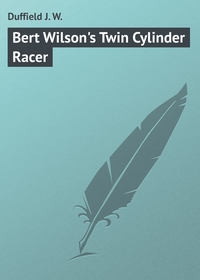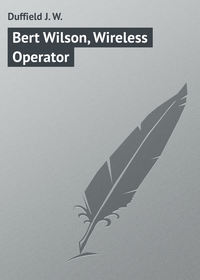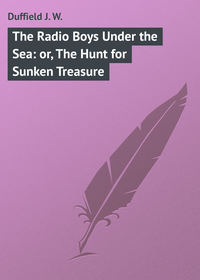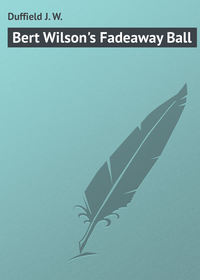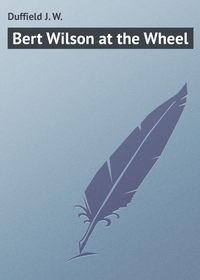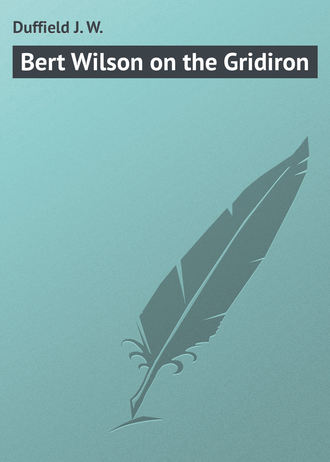 полная версия
полная версияBert Wilson on the Gridiron
In his college days, ten years earlier, he had been a tower of strength on the greatest football team that had ever worn the Blue, and the part he played in its triumphs was still a matter of college song and story. It was the day when mass play counted heavily, when the "guards back" and the "flying wedge" were the favorite formations; and the Blue would never forget how, after a series of line plunging, bone-breaking rushes, he had dragged himself over the enemy's goal line with the whole frantic eleven piled on him, while the Blue stands went stark raving mad over the prowess of their champion. That famous goal had won him an undisputed place on the All-American team for that year and the captaincy of his own team the following season.
His reputation clung to him after he had graduated, and even among his business associates he was commonly and affectionately referred to as "Bull." The same qualities of courage and tenacity that had marked his student days had followed him into the broader arena of business life, and he had speedily become prosperous. But the tug of the old college had drawn him back for more or less time every year to help "lick the cubs into shape" and renew the memories of the past. This year the call had been particularly insistent, owing to two bad seasons in succession, when the Blues had been forced to lower their colors to their exulting rivals who had so many defeats to avenge. A hurry call had gone out for the very best man available to stop the "tobogganing" of the team; and as this by universal consent was "Bull" Hendricks, he had, at a great sacrifice, laid aside his personal interests and come to the rescue.
A few days on the ground had been sufficient to show him that he was "up against it." A herculean task awaited him. The material he had to work with was none too good. The line was lacking in "beef" and the backs in speed. There were exceptions, notably at center and full and quarter; and here his falcon eye detected the stuff of which stars are made. But it takes eleven men to make a team and no individual brilliancy can atone for a lack of combination work. "A chain is no stronger than its weakest link," and, in a modified sense, a team is no stronger than its weakest player. That one weaker player would be unerringly "sized up" by the sharp-eyed scouts of the opposition and they would plunge against him like a battering ram.
Usually, at the beginning of the fall season, there would be an influx of promising candidates from the leading academies and preparatory schools. Fellows who had starred at Andover and Exeter and Lawrenceville, some of them giants in bulk or racehorses in speed, would come in as Freshmen and give the Sophs or Juniors a tussle for the team. But "nothing succeeds like success," and the failure of the Blues for two seasons in succession had tarnished their prestige and turned toward other colleges the players emulous of football glory. The "Greys" and "Maroons" had "gobbled" the most likely "future greats" and the Blues had been replenished by a number limited in quantity and mediocre in quality. Of his veterans, the right guard and left tackle had graduated that summer, and their places in the line would be hard to fill.
Not that the coach felt discouraged. He didn't know the meaning of the word. It simply meant that he would have to work the harder. Like Napoleon, the word "impossible" was not in his dictionary. It was said once of a famous educator that "Mark Hopkins at one end of a log and a student at the other would make a university." With equal truth it could be declared that "Bull" Hendricks on the coaching line and eleven men on the field would turn out a 'Varsity team.
His task was the more difficult just now because he was practically alone. It was too early in the season for the "old grads" to put in an appearance. By and by they would come flocking in droves from all quarters of the compass, eager to renew their youth, and to infuse into the raw recruits some of the undying enthusiasm that they felt for their old Alma Mater. Then every separate player on the team could have the benefit of the advice of some famous former player in his own position, who would teach him every trick and turn by which he had won his own reputation. But at present most of the work devolved on him. He had to teach the backs how to kick, the ends how to run down under a punt, the guards and tackles how to interfere; and into all he had to infuse the deathless determination to win that is the very heart and core of the game. Like a new Atlas, he was carrying the football world on his shoulders, alone.
No, not quite alone. There was "Reddy." And that sorrel-topped individual was a host in himself.
Not one fellow out of ten could have told his real name. He was simply "Reddy" and they let it go at that. His flaming mop of hair to which he owed his nickname covered a shrewd if uneducated mind. For many years he had been connected with the college as head trainer, and in this capacity he had turned out so many winners that he had become famous in the athletic world. He had supreme control of the physical training of all the teams turned out by the college – track, baseball and football – and none excelled him in sending their men to the post in superb condition. He had an unerring eye for an athlete and knew how to bring each individual to the very top of his form. Whatever was in him he brought out to the full. He was a universal favorite in the college. All the boys swore by him, although at times perhaps – for his temper was as red as his hair – they were tempted to swear at him. But if they ever did, it was under their breath, for Reddy was an autocrat, and in his own domain ruled with an iron hand.
Just now, he was, as he himself put it, "as busy as a one-armed paperhanger with the hives." Dinner was over and the football candidates, scrub and 'Varsity alike, were getting into their togs and undergoing the searching scrutiny of Reddy. There were bad knees and ankles and shoulders galore. He began at the soles of the feet and went up to the crown of the head.
"Take off those shoes, Kincaid," he commanded. "The soles are worn so thin that you can't help feeling the cleats through them. Before you know it, your feet'll be so bruised that you'll be wanting a crutch."
"Those phony ankles again, eh," he remarked, as he noticed a slight wobbling on the part of Anderson. "Here," to an assistant, "give me that tape." And with the skill of a surgeon he applied strips of adhesive tape along each ligament, leaving a narrow space down the instep free from bandaging to allow free circulation of the blood. And when he got through, the "phony" ankle was so protected that it was practically impossible for it to turn under its owner.
So, step by step, he went up the human frame that he knew so well. Shin guards were handed out to the forwards to help them against the fierce hammering that they would have to meet. Pads were strapped below the knee and left loose above to give free play to the joints. The thighs were protected by fiber, and large felt pads covered the hips and kidneys. Then with shoulder and collarbone pads, topped by a head guard, the costume was complete. Then Reddy stood in the door that led to the presence of the coach and not a man went through until the trainer's critical eye pronounced him ready for the fray.
"Don't hurry," he said goodnaturedly, as some crowded past him. "'Tis quick enough ye'll be getting in there, I'm thinking," and his eyes twinkled, as he thought of the castigation that awaited them.
To tell the truth, they did not hurry. There were no bouquets awaiting them. They knew that they were due for a raking fore and aft and that they deserved it. No one could tell which one or how many would be "fired" back into the scrubs. More than one of them, on waking in the morning, wondered what made his heart so heavy, until with a qualm the thought of "Bull" Hendricks came to enlighten him. That thought had persisted all through the morning hours, and, if they were distrait in the recitation rooms, the reason was not far to seek. Even Tom's irrepressible spirits were somewhat tamed, although he had less to fear than some of the others.
"Gee," he whispered, "it's like a funeral."
"Don't cheer, boys, the poor devils are dying," murmured Bert.
"They piled the stiffs outside the door,There must have been a cord or more,"quoted Dick.
The subdued way in which the boys filed in gave the coach his cue.
"Nice little flock of sheep," he purred. "Little Bo-Peep will miss you pretty soon and come down here looking for you."
"There was a time," he flashed, "when a Blue football team was a pack of wolves. But you're just sheep and the 'Greys' and 'Maroons' will make mutton of you, all right."
"A football team!" he went on scornfully. "Why, you don't know the rudiments of the game. You're a bunch of counterfeits. You can't tackle, you can't interfere, you can't kick, you can't buck the line. Outside of that, you're all right.
"Now this kind of work has got to stop. As a comic opera football team, you're a scream. If the 'Greys' or 'Maroons' had seen you yesterday, they'd have laughed themselves to death. But no Blue team has ever been a joke in my time, and you're not going to get away with it, if I can pound any brains into your heads or any strength in your muscles. If Nature hasn't done it already, I don't know that I can, but I'm going to try. The team I'm going to send into the field may be licked but it shan't be disgraced. It's going to be an eleven made up of men – not female impersonators. And I'll get them if I have to rake the college with a comb."
From generals he came down to particulars, and his rasping tongue spared no one, as he went over the plays of the day before and described their sins of omission and commission. The men writhed beneath the lash and their faces tingled with shame. But they were game and stood the "lacing" with what grace they might, the more so as they realized that the criticism, though bitter, was just. His whip tore the flesh and he rubbed vitriol into the wounds, but behind it all was his immense passion for victory and his pride in the old college that they loved and wanted to serve as ardently as he did. It was a wry dose and they swallowed it with a gulp, but it braced them to new endeavor, and deep down in their hearts was forming a resolution that boded ill for the scrubs, who had been gloating while the 'Varsity "got theirs."
"Now," the coach concluded, "I'd about made up my mind to fire half this gang of quitters back into the scrubs, but I'm going to give you one more chance. Do you get me? Just one more. For the next hour, you'll practice tackling and passing and interference. Then when you've limbered up your poor old joints, I'm going to line you up against the scrubs. I want you to rip them up, eat them alive, tear them to pieces. And heaven help the 'Varsity man that falls down on the job."
The boys saw some real practice that day. The coach was merciless. They flung themselves against the dummy tackle until they were bruised and sore. They ran down the field under punts until their breath came in gasps. They practiced the forward pass until they were dizzy and seemed to see ten balls flying over the field instead of one. But no one complained or shirked, although every separate bone and muscle seemed to have its own particular ache. A short respite, the 'Varsity and scrub faced each other as they had the day before.
But the hour had struck for the scrubs. They faced their doom. To be sure, they faced it gallantly, but it was doom none the less. From the beginning they never had a chance. All the pent up rage of the 'Varsity that had accumulated while they were being flayed by the coach was poured out on the devoted heads of their opponents. They wiped out the stigma of the day before and paid their debt with interest. It was a "slaughter grim and great," and before their furious attack the scrub line crumpled up like paper.
In vain Morley yelled to his little band to stand fast. They might as well have tried to stem Niagara. Warren and Hodge tackled like fiends. Dick at center and Tom at quarter worked together with the precision of a machine. Bert's mighty kicks were sure to find Caldwell or Drake under them when they came down, and three times he lifted the pigskin over the bars. Then as the play was most of the time in the scrubs' territory, the kicking game gave place to line bucking. Bert was given the ball, and through the holes that Boyd and Ellis made for him in the enemy's line he plunged like a locomotive. There was no stopping them, and the game became a massacre. They simply stood the scrubs "on their heads." Their own goal line was not even threatened, let alone crossed. Touchdown followed touchdown, until when the whistle blew, the 'Varsity had rolled up a score of 54 to 0 and their humiliation had been gloriously avenged.
"Well, Morley," taunted Drake, as the panting warriors left the field, "how about that 'false alarm' stuff?"
"Who's loony now?" crowed Tom.
"Only a spasm," countered Morley, with a sickly grin. "We'll get you yet."
"Bull" Hendricks said never a word as the fellows filed past, but, as he turned to leave the field, his eyes encountered Reddy's, and he favored that grinning individual with a drawing down of the right eyelid that closely resembled a wink. And when he was alone in his own quarters, he indulged in a low chuckle.
"Pretty strong medicine," he said to himself as he lighted his pipe, "but it worked. I guess I'm some doctor."
CHAPTER III
A Thrilling Exploit
A PLEASANT surprise awaited the boys that evening as they went from the training table to their rooms. Under the elms in front of their dormitory, two men were pacing up and down. The close resemblance between them indicated that they were father and son. As they turned toward the boys there was an instant recognition, and they hurried forward in eager greeting.
"Mr. Quinby – Ralph," they cried in chorus.
"We can't tell you how glad we are to see you," said Bert. "What lucky wind blew you so far from California?"
"Business, as usual," responded Mr. Quinby, evidently pleased by the warmth of his welcome. "I had to attend a meeting of directors in New York, and while I was so near, I thought I'd take a day off and run down here for a look around."
"That's what he says," laughed Ralph, "but, as a matter of fact, Dad gets hungry to see the old college every once in so often, and I think he fakes up the 'business' talk just as an excuse."
"Impudent young cub, isn't he?" said Mr. Quinby with mock severity. "But I refuse to say anything in defense, on the ground that I might incriminate myself. Anyway, I'm here, and that's the main point. How are things going with you fellows?"
"Fine," was the response. "But come right on up to our rooms. We're not going to let you get away from us in a hurry, now that we've laid hands on you."
"We'll surrender," smiled Mr. Quinby. "Lead on MacDuff." And they mounted to the rooms that Bert and Dick occupied together, a floor higher up than Tom.
A flood of memories had swept over Bert at the unexpected meeting. Two years had passed since they had been closely associated and many things had happened since that time. Yet all the experiences of that memorable summer stood out in his mind as clearly as the events of yesterday.
Mr. Quinby had been the owner of a fleet of vessels plying between San Francisco and China. Needing a wireless operator on one of his ships, he had applied to the Dean of the college and he had recommended Bert, who was pursuing a course in electricity and making a specialty of wireless telegraphy. Tom and Dick had made that trip with him, and it had been replete with adventure from start to finish. At the very outset, they had been attacked by a Malay running amuck, and only their quickness and presence of mind had saved them from sudden death. Soon after clearing the harbor, they had received the S.O.S. signal, and had been able thereby to save the passengers of a burning ship. A typhoon had caught them in its grip and threatened to send them all to Davy Jones. His flesh crept yet as he recalled the tiger creeping along the deck of the animal ship after breaking loose from his cage. And, traced on his memory more deeply perhaps than anything else, was that summer evening off the Chinese coast when they had been attacked by pirates. Sometimes even yet in his dreams he saw the yellow faces of that fiendish band and heard the blows of the iron bars on their shaven skulls, when old Mac and his husky stokers had jumped into the fray.
How large a part he had played in that repulse he seldom allowed himself to dwell upon in thought and never referred to it in speech. But the country had rung with it, and his friends never tired of talking about it. And none knew better than Mr. Quinby himself that he owed the safety of his vessel and the lives of all on board to the quick wit of Bert in sending the electric current from the dynamo into the wires and hurling the screaming rascals back into their junks. His first words, after they were settled comfortably in their chairs, showed of what he had been thinking.
"Have you run up against any more pirates lately, Bert?" he asked.
"Not of the yellow kind," was the laughing response, "but it looks as though we might meet some white ones before long. They say that the 'Greys' and 'Maroons' are flying the skull and crossbones and threatening to give no quarter, when they stack up against us on the gridiron."
"Threatened men live long," said Mr. Quinby drily. "I've heard that talk before, but I notice that the Blues usually give a good account of themselves when it comes to an actual fight. It was so in my own college days. There'd be all sorts of discouraging rumors afloat and the general public would get the idea that the team was going around on crutches. But when the day of the game came, they'd go out and wipe up the field with their opponents. So I'm not worrying much for fear you'll have to walk the plank."
"You'd have thought so if you had heard the way the coach waded into us to-day," broke in Tom. "Since I heard him, I've had a new respect for the English language. I never knew it had such resources."
"There was a certain honeyed sweetness about it that was almost cloying," grinned Bert.
"'Twas all very well to dissemble his love,But why did he kick us downstairs?"added Dick.
Mr. Quinby laughed reminiscently.
"I've heard coaches talk," he said, "and I know that some of them are artists when it comes to skinning a man alive. They'd cut through the hide of a rhinoceros. But that is part of the game, and if a man is over-sensitive, he doesn't want to try to make a football team. I'll wager just the same that it did you fellows good."
"We licked the scrubs by 54 to 0," answered Tom. "We felt so sore that we had to take it out on somebody."
"Sure thing," commented Mr. Quinby. "Just what the coach wanted. He gets you fighting mad, until when you go out you are 'seeing red' and looking for a victim. I've been there myself and I know."
"Did you ever play on the football team while you were an undergrad?" asked Tom.
"No, I wasn't heavy enough. They needed beef in those days more than they do now. You wouldn't think it, perhaps," with a glance at his present generous girth, "but I was a slender young sprout at that time, and I had to content my athletic ambitions with track work and baseball. But I was crazy over football, and I was always there to root and yell for the team when the big games were pulled off. And many a time since I've traveled from San Francisco all the way to New York to see a Thanksgiving Day game. Sometimes, the result has made me want to go away somewhere and hide, but more often the good old Blue has come out on top, and then I've been so hoarse from yelling that I haven't been able to talk above a whisper for a week. Of course it wouldn't be a good thing for the game if one team won all the time, and as long as we cop about two out of three, I'm not doing any kicking. It isn't often that we lose two years in succession, and I'm looking for you fellows now to come across with a victory."
"We'll do our best not to disappoint you," said Bert. "It's a sure thing that we haven't as heavy a line as we've had in other years, and for that reason we'll have to play more of an open game. But we've got a dandy new shift that will give the other fellows something to think about when we spring it on them, and probably Hendricks has one or two aces up his sleeve. I heard him tell Reddy the other day that he was planning a variation of the forward pass that he thought would be a corker."
"Well," said Mr. Quinby, "we'll hope so. It's almost as hard to forecast results in football as it is in baseball. The game's never over until the referee blows his whistle. I've seen teams touted as certain winners go all to pieces on the day of the game. Then, again, there have been times when the team didn't seem to have as much of a chance as a blind man in a dark room hunting for a black cat that wasn't there. But they'd go out just the same and stand the other fellows on their heads."
"You must have seen a lot of sparkling plays in your time," remarked Tom enviously.
"I surely have," assented Mr. Quinby. "Perhaps the best of all was one that thrills me now when I think of it, although I didn't enjoy it so much at the time, because it did the Blues out of a victory just when they thought they had it tucked away safely."
"Tell us about it," came in a chorus from the boys.
"Well, it was this way," and he lighted a fresh cigar as he settled back for a "fanning bee." "The 'Greys' came up to meet us that year with one of the best teams they ever turned out. They seemed to have everything, weight and strength and speed, and, on the 'dope,' we didn't have a chance in the world. They had gone through their schedule with the smaller colleges like a prairie fire, and the scores they piled up had been amazing. Their goal line hadn't been crossed all season, and all the newspaper writers tipped them to slaughter us.
"We had a dandy captain that year, though, and he, together with the coaches, had done wonders with the material on hand. The old Blue spirit that never knows when it is licked was there too. The game was on our grounds and although the 'Greys' had an immense delegation in their stands, we outnumbered and outyelled them. Say, maybe we didn't give the boys a send-off when they trotted through the gates and began passing and falling on the ball in practice. If we felt any doubts, that yell didn't show it.
"From the time the ball was kicked off it was a fight for blood. And you can imagine whether we fellows went crazy when we saw that our team was winning. We got off to a flying start, and, instead of having to defend our own goal, we took the offensive and kept the ball in the enemy's territory most of the time. We scored a goal from the field, and although the 'Greys' fought desperately, we seemed to have their number.
"It was the same in the second half. We downed them when they tried to rush us, blocked when they kicked, and stopped them in their attempt to skirt the ends. It was near the end of the last half, and there was only five minutes left to play. It looked as though it were 'all over but the shouting,' and you can bet that we were doing enough of that. The Blue stands were a good imitation of a lunatic asylum.
"But here Fate took a hand, and two minutes later we wanted to die. The ball was in our hands, halfway down the field. As we had already made one score, while the 'Greys' had nothing, all we had to do was to play safe and the game was ours.
"Peters, our captain, was a splendid fellow and a 'dead game sport.' It seemed to him a little like 'babying' to fritter away the few minutes remaining in safety play. The more generous instinct prevailed, and he 'took a chance.' He shot the ball back to the quarter. He in turn passed it to the back, who got in a perfect kick that sent it far down the field and close to the enemy's goal. One of the 'Greys' made a grab at it, but it was one of those twisting deceptive punts and bounded out of his hands down toward the southern line. One of his mates was just behind him and, quick as lightning, he caught the ball on the bound, tucked it under his arm and scooted down the field toward our goal line.
"Our forwards of course had run down under the kick and had got past the ball, expecting to pick it up when they saw that it had been muffed. So the 'Grey' runner was well past them before they could stop their momentum and turn in their tracks. The back who had kicked the ball was near the northern side, too far away to interfere, and Lamar, the runner, covering the ground like a deer, hugged the southern line.


